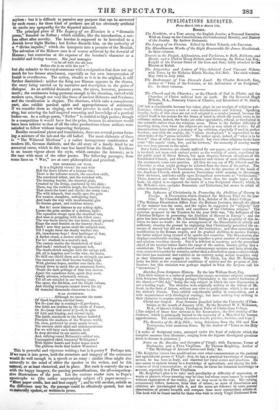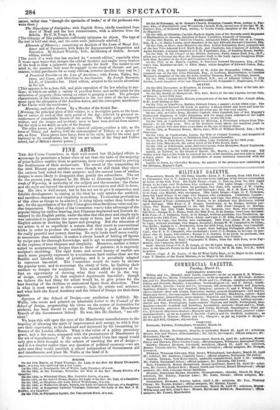PUBLICATIONS RECEIVED.
From March 13th to March 19th.
BOOKS.
The Novitiate, or a Year among the English Jesuits; a Personal Narrative. With an Essay on the Constitutions, the Confessional Morality, and History of the Jesuits. By Andrew Steinmetz.
The Legacy of an Etonian. Edited by Robert Nolands, sole Executor.
The Miscellaneous Works of the Right Honourable Sir James Mackintosh. In three volumes.
Travels in the Punjab, Afghanistan, and Turkistan, to Balk, Bokhara and Herat; and a Visit to Great Britain and Germany. By Mohan Lai, Knight of the Persian Order of the Lion and Sun; lately attached to Mission at Kabul.
The Dispatches and Letters of Vice-Admiral Lord Viscount Nelson; with Notes, by Sir Nicholas Harris Nicolas, G.C.M.G. The sixth volume. May 1804 to July 1805.
The Bushranger of Van Diemen's Land. By Charles Rowcroft, Esq., Author of "Tales of the Colonies, or the Adventures of an Emigrant," &c. In three volumes.
The Church and the Churches ; or the Church of God in Christ, and the Churches of Christ militant here on earth. By the Reverend Hugh BPNeile, M.A., Honorary Canon of Chester, and Incumbent of St. Jude a, Liverpool.
[Of late a considerable increase has taken place in our receipts of religious pub- hcations; which imposes a task of some discrimination and delicacy. Speaking broadly, books of this class are not well adapted to a secular journal, because the subject itself is too serious for the frame of mind in which the reader turns to its columns; unless, indeed, the books are either speculative, ethical, or theological in the scientific rather than the religious sense. There is the further difficulty of handling them, even when the subjects are such as may admit of netice: for all denominations have rather a jealousy of lay criticism, especially if used in perfect freedom; and with the zealous, the ' odium theologicum " is supemdded to the other traits of the "genus irritabile." We rather speak, indeed, ot what is to be feared" than of what we have encountered; but even when religious books have come " like angels' visits, few, and far between," the necessity of moving warily has ever been present to the mind. Some books, however, are clearly unfitted for our pages; as where controversy is involved, not upon such curious points as the worship of saints, repudiated by the public mind of Great Britain, but upon disputes between clergymen of the
Established Church, and where the character and virtues of such ordinances as the sacraments come into question. All that we can say of The Church and the
Churches is what might perhaps be inferred from the name of its anther. The volume is in opposition to Tractarian views, and to the practice of the heads of the Anglican Church, which promotes Tractarians while seeming to discourage their doctrines, and looks coldly upon Evangelical movements as , enthusiastic." These, however, are rather the animating views than the staple topics of the book: its object is to expound the traits of a true Scriptural church; which, in Mr. M‘Neile s view, excludes Romanists and Unitarians, but seems to admit all other denominations.] The Influence of Christianity in Promoting the Abolition of Slavery in Europe. A Dissertation which obtained the Hulscan Prize for the year 1845. By Churchill Babington, B.A. Scholar of St. John's College. [The Hulsean Dissertation differs from the Hulsean Lectures, though the object of the testator was the same, and the topics he suggested for "subjects" very similar—" to evince the truth and excellence of the Christian religion." The question proposed by the Trustees for the year 1845 was, "the Influence of the Christian Religion in promoting the Abolition of Slavery in Europe "; and the prize has been awarded to Mr. Churchill Babington. Of the propriety of this de- cision we have no doubt: for the arrangement of the Dissertation is orderly and sufficient; clearing the ground by explaining that Christianity permitted the ex- istence of slavery but dal not approve of the institution; and then examining its
modification in the Roman empire, and its gradual abolition in modern Europe; the latter subject being treat of by epochs and countries. The Dissertation also
displays considerable reading, and brings together a great number of curious facts and opinions touching slavery. But it is deficient in mastery; and the prescribed object of the treatise rather limits the range of the author, besides giving him a onesided air. The book is a collection of contemporary opinions and facts about sla- very, connected together by remarks, rather than a dissertation upon a subject which the mind has mastered and exhibits in its entirety, using actual examples only
as they illustrate and support its views. We think, too, that Mr. Babington too little at the economical conditions of society and the progress of civi- lization: but this omission was perhaps implied in what the lawyers call his " intructions."]
Sketches from Scripture History. By the late William Scott, Esq. [This little volume is a series of posthumous essays on various subjects connected with Scripture History; though perhaps Christianity is the correct limitation of the theme,—" Old Age" being the only subject in which the new dispensation is not a leading topic. The sketches were originally written to the friends of Mr. Scott, in the form of letters, without any view to publication; which is the act of the author's friends. They exhibit considerable ability in composition, and a wide acquaintance with theological reading; but have nothing very striking in their character to require extended notice.] Christ our Gospel. Four Sermons preached before the University of Cam- bridge, in the month of January 1846. By the Reverend W. F. Wilkinson, M.A., of Queen's College, Theological Tutor of Cheltenham College.
[The subject of these four sermons is the Incarnation; the first treating of the evidence, which is principally limited to the necessity of a Man-God for human. apprehensions. The remaining discourses handle practice, doctrine, and hope.] The Beauties of the Holy Bible ; being Selections from the Old and New Testaments, with numerous Notes. By the Author of "Lines on the Holy Bible."
[A series of Scriptural texts arranged under the head of subjects which the compiler assumes they illustrate; ranging from the highest theological questions down to lessons in grammar.]
Notes on the Bucolics and Georgics of Virgil with Excursus' Terms of Husbandry, and a Flora Virgillana. By Thomas Keightley, Author of "The Mythology of Ancient Greece and Italy," &c.
[Mr. Keightley claims two qualifications over other commentators on the pastoral and agricultural poems of Virgil: first, he has a practical knowledge of farming;
second, he has been in Italy., and observed her rural scenes and practices. He also seems to include botany m a knowledge of agriculture, and among the defi- ciencies of rival commentators: at all events, he turns his botanical knowledge tie account, especially in a Flora Virmliana.
Mr. Keightley's plan is to take each peculiarity or difficulty of expression, or words or phrases whose meaning may be clear but whose sense cannot be acquired without explanation of the reality, just as they occur in the text. His running commentary differs, however, from that of others; as more of dissertation and criticism are intermingled with it, and the notes are followed by some general observations of greater breadth and compass than mere commentary admits of. The book will be found useful for those who wish to study Virgil illustrated from nature, rather than "through the spectacles of books," or of the professors who write them.) The Hippolytus of Euripides; with English Notes, chiefly translated from those of Monk and the best commentators, with a selection from the Scholia. By C. D. Yonge, B.A. [The titlepage of this publication sufficiently intimates its object. The type of the text is bold and clear, and the notes seem judiciously selected.] Elements of Rhetoric ; comprising an Analysis of the Laws of Moral Evi- dence and of Persuasion, with Rules for Argumentative Composition and Elocution. By Richard Whately, D.D., Archbishop of Dublin. Seventh edition, revised.
LThe merit of a work that has reached its "seventh edition," especially when it treats upon topics that sharpen the critical faculties and enable every student of the book to form a judgment upon it, speaks for itself. The wonder to our Mind is, the numbers that must be engaged in the study of rhetoric and per- suasion, to Led purchasers for so many editions, however excellent they may be.] A Practical Treatise on the Law of Auctions ; with Forms, Tables, Sta- tutes, and Cases, and Directions to Auctioneers. By Joseph Bateman, LL.D., of Lincoln's Inn. Third edition, adapted to the recent alterations in the law.
[This appears to be a close, full, and plain exposition of the law relating to auc- tions; to which are added a variety of practical forms and useful tables for the estimation of property.; from valuing an estate to gauging a cask. The principal characteristic of this edition is its adaptation to the new state of the law conse- quent non the abrogation of the Auction-duties, and the consequent interference of the Excise with the auctioneer.]
Morning, and other Poems. By a Member of the Scotch Bar.
[Morning, the principal piece of this volume, is a descriptive poem on the beau- ties of nature as seen at that early period of the day; relieved by personal re- miniscences of remarkable friends of the author. The whole poem is elegantly written, and the images and incidents seem to have been derived from nature; but the style is too much an echo of the Seasons. The other poems are principally on classical subjects,-either a tale, as the loves of Tithon and Aurora, with the metamorphose of Tithon; or a species of ode, as Eros. These pieces have fancy, force in the style, and for the most part harmony in the versification; but they too are echoes of the Gray and Collins school, and of Milton's shorter poems.]



























 Previous page
Previous page